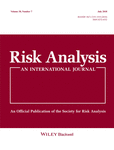 Abstract
Abstract
For those at risk for Zika virus infection, prevention requires an approach that includes individual, interpersonal, and community‐level support for behavior change. In August 2016, the announcement of local Zika transmission in Florida provided an opportunity to determine whether Zika‐related knowledge, attitudes, and behaviors might be affected differentially in Florida compared to the rest of the nation. From August 8–October 3, 2016, we conducted nationally representative weekly surveys (N = 12,236), oversampling Florida residents, measuring Zika virus news exposure, knowledge about transmission and prevention of the infection, and attitudes and behaviors toward prevention. We tested two classes of models: those focused on individual Zika risk perceptions (e.g., protection motivation theory) and one focused on community action beyond those directly at risk (social consensus model). Analyses assessed differences between Florida and the rest of the nation by survey week. Consistent with both models, Floridians demonstrated significantly higher levels of perceived susceptibility and knowledge, more positive attitudes toward Zika virus prevention, and higher likelihood of engaging in protective behavior than non‐Floridians. Consistent with theories of individual risk perception, response was greater among respondents who saw themselves at risk of infection. However, consistent with the SCM, irrespective of personal risk, response was greater among Floridians. Nevertheless, more than half of the public took no direct action to prevent the spread of Zika. Communities at increased risk for a novel infection such as Zika may quickly acquire Zika‐related knowledge, attitudes, and behavior, but large‐scale community‐wide response might be difficult without further community‐level public education.
Authors
- Kenneth M. Winneg
- Jo Ellen Stryker
- Daniel Romer
- Kathleen Hall Jamieson

